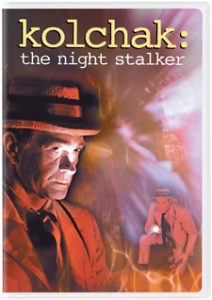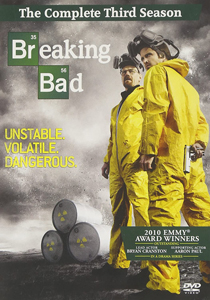Over six Sundays, we’re looking back at the five seasons (and one movie) of one of the last decade’s elite TV series: AMC’s “Breaking Bad.” Next up is Season 3 (2010):
Acquiring new skills
In the 1999 comedy “Office Space,” hapless cubicle workers look up “money laundering” in the dictionary, and “Breaking Bad” Season 3 finds Skyler White (Anna Gunn) looking up the term on Wikipedia.
But she’s not as in over her head as those office drones, having picked up lying and other skills from her husband, Walter (Bryan Cranston), as Vince Gilligan’s show eventually drags everyone deeper in moral gray areas. (At least RJ Mitte’s Walter Jr. is immune so far, as he dreams of getting a ’Stang as his first car.)
Season 3 is deliberate enough that we believe Skyler’s transformation, just as we’ve bought into Walt’s before this. The slow pace arguably hurts the season in the first half – when Skyler is intent on a divorce and Walt pushes back, an irreconcilable conflict that ends with an extra-large pizza on the garage roof.
Skyler might be “Breaking Bad’s” most annoying character, but she’s not dumb, and it’s neat to look back at those scenes of her going over her employer’s books and realizing she’s soaking up knowledge about hiding money even as she’s considering shacking up with her boss.
We also get the divisive slow-as-molasses episode “Fly” (10), where Walt spends the entire hour in the lab trying to swat a fly, illustrating the psychological strain of making black-market meth.
Twisty path to finish line
Yet I was thrilled to desperately keep up with the narrative and moral twists and turns in the last couple episodes, notably the masterful finale, “Full Measure” (13). It earns a spot among the all-time great season finales, as writer-director Gilligan wrings tension from things implied, not explicitly stated.
It reminds me of the “Buffy” Season 2 finale, another episode where you absorb seemingly small pieces of information that pay off in a surprising – yet inevitable in retrospect – way. This is the TV-writing craft at its finest.
I didn’t even realize Gus (Giancarlo Esposito, always eerily calm) intended to kill Walt, nor that Mike (Jonathan Banks) doesn’t always answer to lawyer Saul (Bob Odenkirk), but that’s because I’m still as naïve as Season 1 Walt — the character himself is savvier by now.
In a brilliant move, Walter gets Jesse (Aaron Paul) to kill assistant meth-maker Gale (David Costabile), thus preserving Walt’s irreplaceability in Gus’ operation — and his life (although Gus’ and Walt’s warm employer-employee relationship is probably shattered for good).
The first two seasons (which, amusingly, I’m starting to think of as the “lighter” seasons) show a back-and-forth in wise and dumb moves by the partners, with Walt providing the scientific know-how and Jesse the street smarts. Season 3 is a moral back-and-forth, with Walt the high school chemistry teacher often more willing to go to the dark side than Jesse the drug dealer.

Jesse’s humorous decency
Jesse’s deep-seated decency sometimes leads to high comedy; for example: his scheme to use his own drug-rehab group to scout potential buyers. He has Badger (Matt L. Jones) and Skinny Pete (Charles Baker) pose as group members, but they are unable to find buyers, and instead (hilariously) end up working the steps of the program.
Aiming to show his ridiculous friends how it’s done, he targets Andrea (Emily Rios, “The Bridge”), but before long he’s kissing her, meeting her son and lecturing her about how she shouldn’t use drugs. He’s maybe even worse than Badger and Pete at selling; his moral compass can’t take it.
“Breaking Bad” doesn’t merely play different tones, it can smoothly switch among them. Things turns serious – and we’re reminded what a relatively small place Albuquerque’s drug circles are — when Jesse learns in “Abiquiu” (11) that Andrea’s brother is the 11-year-old kid who killed Combo (Rodney Rush) back in Season 2.
Jesse decides to take matters into his own hands, and this is when Gilligan and his team masterfully pay off what they’ve been carefully building, culminating in this grand finale of a moral conundrum: Would you kill an innocent person to save your friend’s life? Paul’s amazing performance, with tears on Jesse’s face as he points the gun at the doomed Gale, is that horrific question brought to life.
Before Season 3 becomes so heart-wrenching, it’s a brainy journey. A viewer can learn a ton about the specifics of illegal-drug economics. Saul spells out the process of money laundering to Jesse even before Skyler gets in on Walt’s part of the game.
Offshoot jobs
As complicated as hiding the source of the money is, that’s actually basic stuff in this line of work. Season 3 goes even deeper into the offshoot jobs provided by the drug war; for instance, the job of quickly disposing of a mobile lab when the DEA targets it.
Our heroes – via the endlessly resourceful Saul – find someone to dispose of the RV. But in writer John Shiban’s brilliant “Sunset” (6), Walt’s brother-in-law, DEA agent Hank (Dean Norris), tracks down the RV first, with Jesse and (not to Hank’s knowledge) Walter inside.
In addition to being a masterpiece of tension, this episode shows us the Fourth Amendment in action as Jesse and Walt are able to keep Hank at bay long enough to devise a plan. They’d have no protection from a digital data search, but the Fourth Amendment still has some muscle against physical searches.
After barely surviving an attack by the Salamanca Brothers (Daniel and Luis Moncada), Hank is hospitalized and faces a long road toward walking again. This seems a good time to note that Norris must be a darn good actor: Even though Hank has a punchable face, I root for him against the brothers, whose quietly terrifying nature is built up through the season’s early episodes.
Dishonor among DEA
Add in the twist that the agency will not cover Hank’s medical bills – he’s rightly suspended for assaulting Jesse at the time he himself is attacked, but his DEA job is the reason he’s attacked – and we have a good example of how the agency doesn’t even look out for its own. So I feel sympathy for Hank.
This is despite the fact that I oppose the drug war and believe the DEA should not exist. This year, there’s an increasingly popular push toward revisiting the legality of the DEA in the courts, as it (along with other federal alphabet agencies) has no Constitutional authorization to exist.
If that ever bears fruit (I know it’s wishful thinking), Hank could be relegated to the past, and it would mark a rare example of “Breaking Bad” being a time capsule.
For the most part, though, these episodes remain fresh a decade after they aired. Moral dilemmas, after all, pre-date the drug war, and will post-date it. And being a good person, as Jesse is, doesn’t absolve you from being thrust into such situations.


